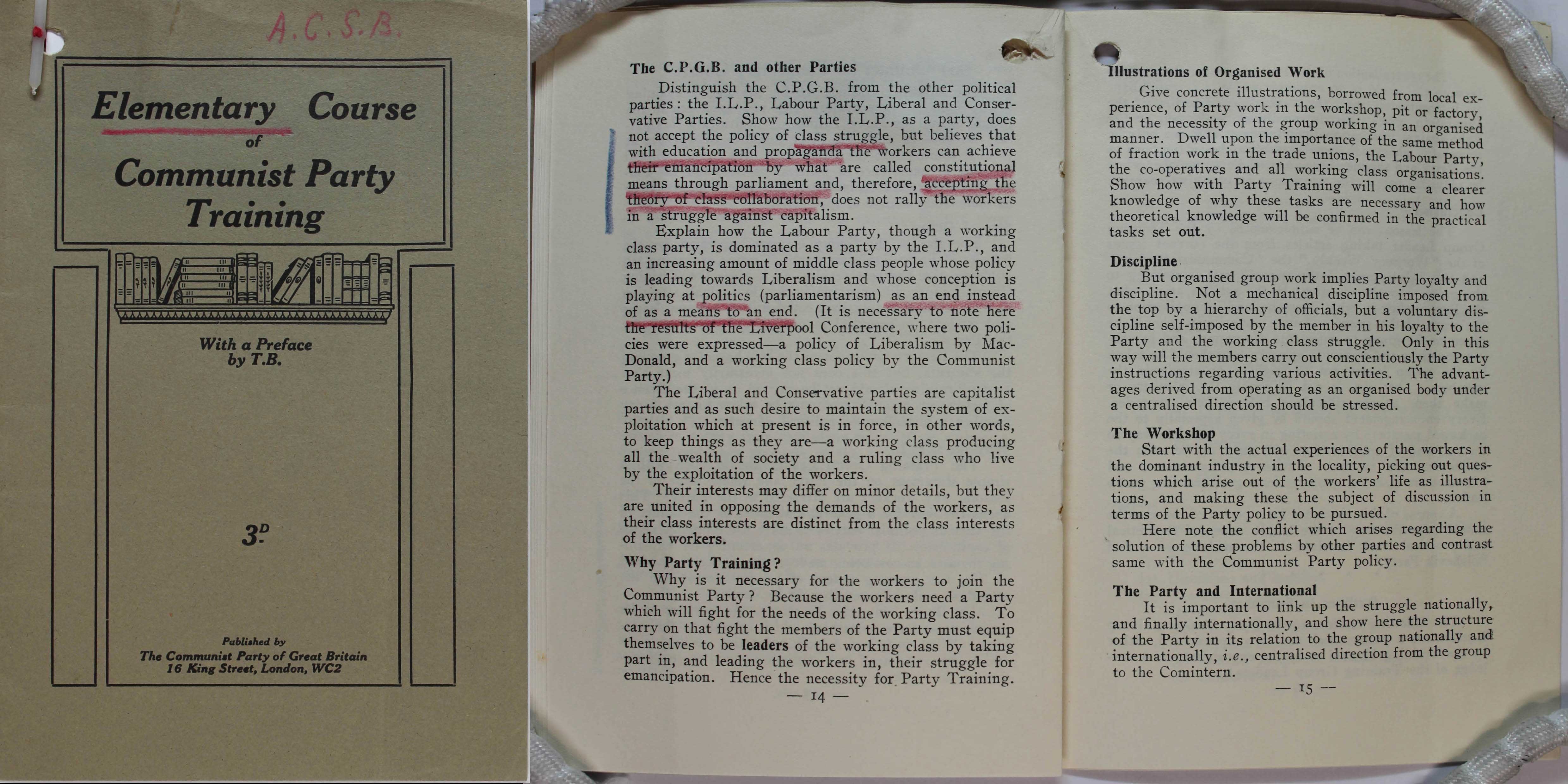
Extract from the Communist Party booklet (Catalogue ref: DPP 1/118)
Transcript
Elementary Course of Communist Party Training
With a preface by T.B.
3d
Published by
The Communist Party of Great Britain
16 King Street
London W.C.2
The C.P.G.B. and other Parties
Distinguish the C.P.G.B. from the other political parties: the I.L.P., Labour Party, Liberal and Conservative Parties. Show how the I.L.P., as a party does not accept the policy of class struggle, but believes that with education and propaganda the workers can achieve their emancipation by what are called constitutional means through parliament and therefore, accepting the theory of class collaboration, does not rally the workers in a struggle against capitalism.
Express how the Labour Party, though a working class party, is dominated as a party by the I.L.P., and an increasing amount of middle class people whose policy is leading towards Liberalism and whose conception is playing at politics (parliamentarism) as an end instead of as a means to an end. (It is necessary to note here the results of the Liverpool Conference, where two policies were expressed—a policy of Liberalism by MacDonald, and a working class policy by the Communist Party.)
The Liberal and Conservative parties are capitalist parties and as such desire to maintain the system of exploitation which at present is in force, in other words, to keep things as they are-a working class producing all the wealth of society and a ruling class who live by the exploitation of the workers.
Their interests may differ on minor details, but they are united in opposing the demands of the workers, as their class interests are distinct from the class interests of the workers.
Why Party Training
Why is it necessary for the workers to join the Communist Party? Because the workers need a Party which will fight for the needs of the working class. To carry on that fight the members of the Party must equip themselves to be leaders of the working class by taking part in, and leading the workers in, their struggle for emancipation. Hence the necessity for Party Training.
Illustrations of Organised Work
Give concrete illustrations, borrowed from local experience, of Party work in the workshop, pit or factory, and the necessity of the group working in an organised manner. Dwell upon the importance of the same method of fraction work in the trade unions, the Labour Party, the co-operatives and all working class organisations. Show with Party Training will come a clearer knowledge of why these tasks are necessary and how theoretical knowledge will be confirmed in the practical tasks set out.
Discipline
But organised group work implies Party loyalty and discipline. Not a mechanical discipline imposed from the top by a hierarchy of officials, but a voluntary discipline self-imposed by the member in his loyalty to the Party and the working class struggle. Only in this way will the members carry out conscientiously the Party instructions regarding various activities. The advantages derived from operating as an organised body under a centralised direction should be stressed.
The Workshop
Start with the actual experiences of the workers in the dominant industry in the locality, picking out questions which arise out of the workers’ life as illustrations, and making these the subject of discussion in terms of Party policy to be pursued. Here note the conflict which arises regarding the solution of these problems by other parties and contrast same with the Communist Party policy.
The Party and the International
It is important to link up the struggle nationally, and finally internationally, and show here the structure of the Party in its relation to the group nationally and internationally, i.e., centralised direction from the group to the Comintern.
